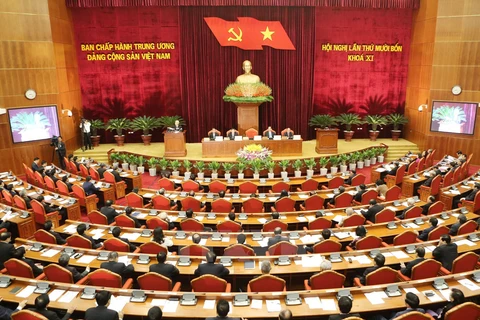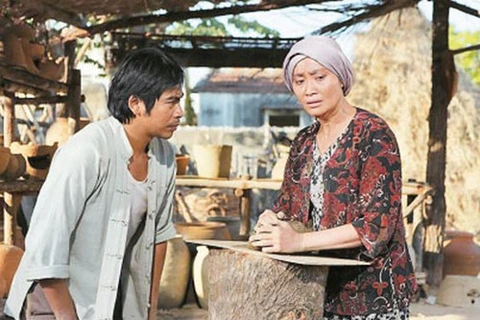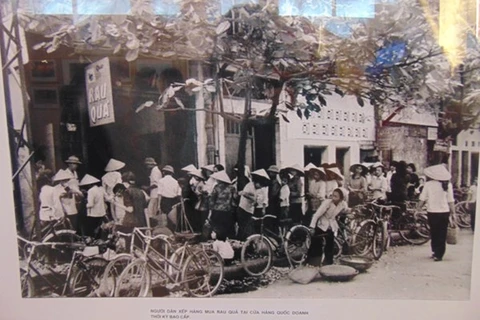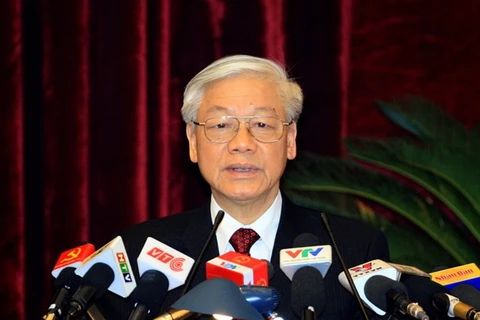Hanoi (VNA) — Since its establishment, the Communist Party of Vietnam has held 11 Congresses. Each Congress is considered an important historical milestone in recognising the Vietnamese revolution’s victories, achievements and lessons.
Here is an introduction to each Congress as summarised by the Vietnam News Agency.
A conference to unite Communist organisations in Vietnam, presided over by Nguyen Ai Quoc, took place from February 3-7, 1930 in Kowloon, Hong Kong (China). This was an event of historical significance as the Congress establishing the Communist Party of Vietnam.
The conference passed the Party’s Brief Political Platform, Brief Policy and Brief Statutes and outlined guidelines for national liberation and the advance towards socialism.
The first plenum of the Party Central Committee, which was held in Hong Kong from October 14-31, 1930, decided to rename the Communist Party of Vietnam the Communist Party of Indochina and adopted the political programme and important resolutions on urgent tasks to mobilise particular groups of the masses. The meeting elected the official Party Central Committee with Tran Phu being the General Secretary.
The first National Party Congress: consolidating and developing forces to lead the whole nation to fight imperialism and wars.
Immediately after its establishment, the Party led the movement for national liberation to initial victories, with the Soviet-Nghe Tinh movement (1930-1931) being the peak.
Following these victories, the French colonialists suppressed the patriotism movement. Party General Secretary Tran Phu and many other communists were arrested. Following the direction of the Communist International, the Overseas Directing Bureau (Overseas Bureau) of the Communist Party of Indochina was established in early 1934 with Le Hong Phong as the secretary. The bureau played a leading role and restructured the Party Central Committee.
The first National Party Congress took place in Macau, China, from March 27-31, 1935, with the participation of 13 delegates from domestic Party committees as well as overseas Party organisations. The Congress was presided over by Ha Huy Tap.
It reviewed the restoration of the Party organisation and the people’s movement, and mentioned three key tasks: consolidating and developing the Party, intensifying mass mobilisation and increasing public awareness of the anti-imperialism and anti-war cause.
The Congress elected a 13-member Party Central Committee. Leader Nguyen Ai Quoc was nominated the Party representative to the Communist International. Le Hong Phong was elected as Party General Secretary.
The first National Party Congress was an important historical event, marking the fundamental victory of the struggle to preserve and restore the organisational system of the Party from the central to grassroots levels.
A meeting of the Party Central Committee was held in Shanghai, China, in July 1936 to identify the Party’s new guidelines on revolutionary strategy and tactics in Indochina. The meeting elected Ha Huy Tap as General Secretary.
In March 1938, the Party Central Committee met and decided to expand the Indochina Democratic United Front. At the meeting, Nguyen Van Cu was elected to the Party Central Committee’s Standing Board and then the General Secretary.
The Party Central Committee meeting chaired by Cu in November 1939 decided to adjust the strategic directions of the Indochinese revolution making them suitable for the new situation. After that time, the revolutionary movement saw huge support throughout the country, leading the way for the General Uprising.(to be continued) -VNA

























